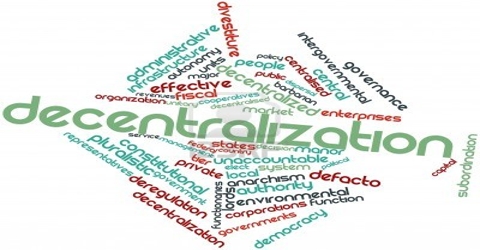Decentralization explains the manner in which decision making responsibilities are divided among hierarchical levels. Put simply, decentralization refers to delegation of authority throughout all the levels of the organization. Decision making authority is shared with lower levels and is consequently placed nearest to the points of action. In other words decision making authority is pushed down the chain of command. When decisions taken by the lower levels are numerous as well as important an organization can be regarded as greatly decentralized.
Different types of decentralization should be distinguished because they have different characteristics, policy implications, and conditions for success.
Types of decentralization include political, administrative, fiscal, and market decentralization.
- Political decentralization aims to give citizens or their elected representatives more power in public decision-making.
- Administrative decentralization seeks to redistribute authority, responsibility and financial resources for providing public services among different levels of government.
- Financial responsibility is a core component of decentralization. If local governments and private organizations are to carry out decentralized functions effectively, they must have an adequate level of revenues.















